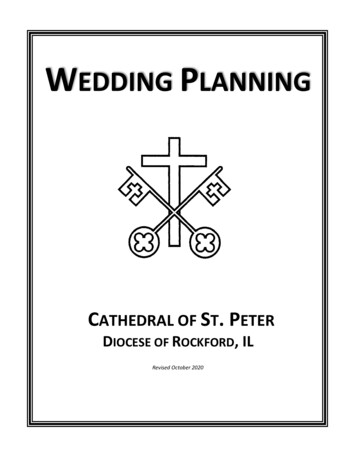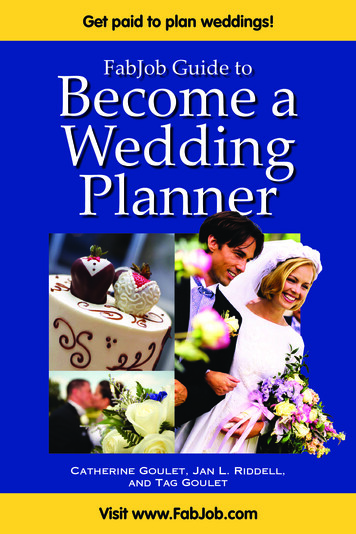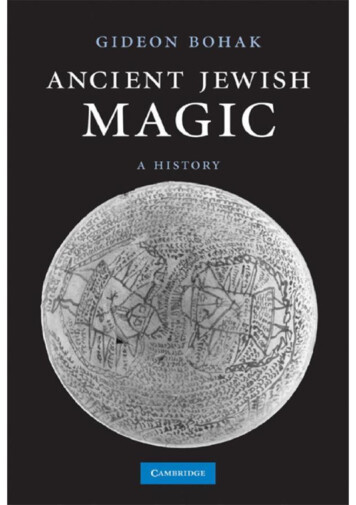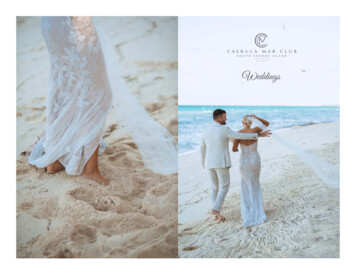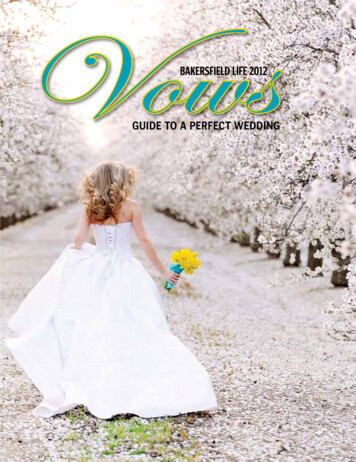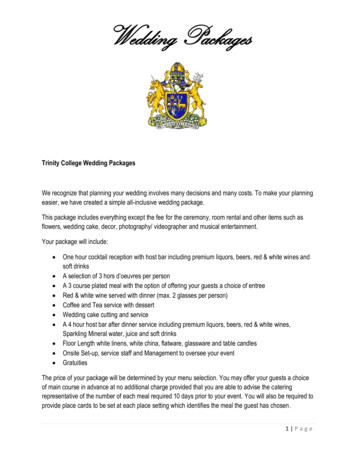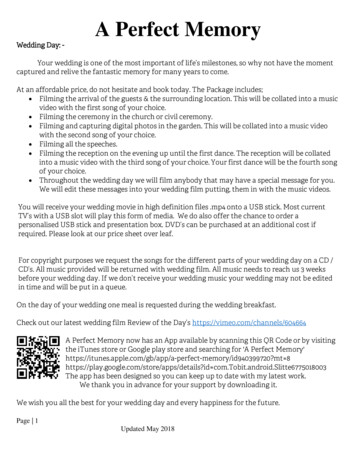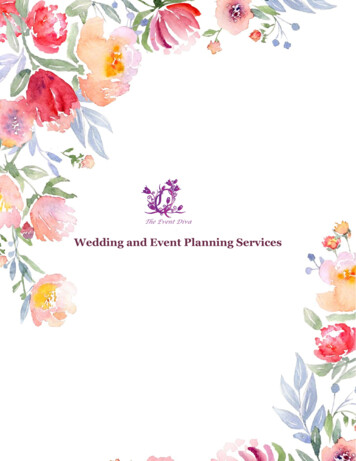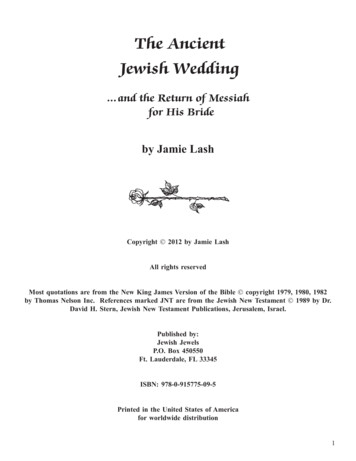
Transcription
The AncientJewish Wedding. and the Return of Messiahfor His Brideby Jamie LashCopyright 2012 by Jamie LashAll rights reservedMost quotations are from the New King James Version of the Bible copyright 1979, 1980, 1982by Thomas Nelson Inc. References marked JNT are from the Jewish New Testament 1989 by Dr.David H. Stern, Jewish New Testament Publications, Jerusalem, Israel.Published by:Jewish JewelsP.O. Box 450550Ft. Lauderdale, FL 33345ISBN: 978-0-915775-09-5Printed in the United States of Americafor worldwide distribution1
DedicationIn loving memory of my dear friend Sylvia Candib Hurston who has been like a mother to me, alwaysencouraging, loving and giving in simplicity and selflessness.Thank you, Sylvia, for loving our Messiah and for loving Neil and me with so much fervor and faithfulness. May the Lord be your portion and your delight forever.AcknowledgmentsI am deeply grateful to my bridegroom Neil for being such a wonderful, giving husband and forbearing with me in love as Yeshua prepares and perfects me in Him.My thanks also to our dedicated Jewish Jewels staff, especially our Administrator, Sheryl Campo.Each labors tirelessly and selflessly so that God's People Israel can come to know Him in a personalway.I also owe a debt of gratitude to the Jewish Jewels Prayer Roses and other faithful friends who haveprayed for us behind the scenes for years—unseen by men perhaps, but not by God.May your labor oflove in His Name be richly rewarded!A final word of thanks is due to Freiman Fisher Stoltzfus for blessing us with beautiful, anointedillustrations. May the Lord open many doors for your outstanding artistic gift.PrefaceMy fascination with brides and weddings goes back to my childhood. When an occasion calledfor dressing up in costume, my first choice was always to be a bride. Once, as a young girl, I caught thebouquet at a wedding. I was thrilled and kept the bouquet for years.Because of my love of weddings, I've had three of them with the same man! My husband Neilmarried me the first time on Feb. 7, 1971 in my parents' home in Valhalla, NY. We were remarried undera huppah on our 7th anniversary in a Messianic ceremony at Temple Aron HaKodesh in Ft. Lauderdale,Florida. We celebrated our 25th anniversary in 1996 by re-enacting the ancient Jewish wedding customs inIsrael on a hillside overlooking the old city of Jerusalem.Since receiving the Messiah in 1973, weddings have taken on an even deeper meaning for me as Ihave come to understand what it means for believers in Jesus (whom I call by His Hebrew name, Yeshua)to be His "bride." This bridal relationship with the Messiah has become the greatest source of joy in mylife. I pray that this same joy will be yours!2
Table of ContentsDedication. . . . . . . . . . . . . . . . . . . . . . . . . . . . . . . . . . . . . . 2Acknowledgments. . . . . . . . . . . . . . . . . . . . . . . . . . . . . . . . 2Preface. . . . . . . . . . . . . . . . . . . . . . . . . . . . . . . . . . . . . . . . . . 2The Ancient Jewish Wedding. . . . . . . . . . . . . . . . . . . . . . 4A Bridal Relationship. . . . . . . . . . . . . . . . . . . . . . . . . . . . . 4Selection of the Bride . . . . . . . . . . . . . . . . . . . . . . . . . . . . 5The Bride Price . . . . . . . . . . . . . . . . . . . . . . . . . . . . . . . . . 6Betrothal/Ketubah. . . . . . . . . . . . . . . . . . . . . . . . . . . . . . . . 7The Bride's Consent. . . . . . . . . . . . . . . . . . . . . . . . . . . . . . . 9Cup of the Covenant . . . . . . . . . . . . . . . . . . . . . . . . . . . . . 10Gifts for the Bride. . . . . . . . . . . . . . . . . . . . . . . . . . . . . . . 11Mikvah . . . . . . . . . . . . . . . . . . . . . . . . . . . . . . . . . . . . . . . . 12Departure of the Bridegroom. . . . . . . . . . . . . . . . . . . . . . . 13The Consecrated Bride. . . . . . . . . . . . . . . . . . . . . . . . . . . . 14Return of the Bridegroom. . . . . . . . . . . . . . . . . . . . . . . . . 16The Huppah . . . . . . . . . . . . . . . . . . . . . . . . . . . . . . . . . . . . 17The Marriage Supper. . . . . . . . . . . . . . . . . . . . . . . . . . . . . 19The Jewish People: His First Choice . . . . . . . . . . . . . . . . 20Bibliography. . . . . . . . . . . . . . . . . . . . . . . . . . . . . . . . . . . . 21About the Author. . . . . . . . . . . . . . . . . . . . . . . . . . . . . . . . 223
The Ancient Jewish WeddingThe ancient Jewish wedding has special relevance for the days in which we live because these are thedays immediately preceding the return of the Messiah Yeshua for His bride. When He comes in the cloudsto take us away with Him, He will not come as a carpenter, nor as a rabbi, teacher, shepherd, nor even ahigh priest. He is coming again as a Bridegroom/King. At this very moment, His heart is longing for theday when He will gather His bride unto Himself. This union has been in the heart and plan of God fromthe beginning of time.The Bible chronicles the love relationship between God and His people. It tells us of the marriage ofGod to Israel and the marriage covenant that He kept, even though His people did not (Jeremiah 31:32).It also tells us of a new marriage covenant for both Jews and non-Jews. The entire Bible is actually amarriage covenant, both "Old" and "New." When seen in this light, the need to understand Jewish marriagecustoms at the time of Yeshua comes into focus.Our Messiah followed the steps of a Jewish bridegroom in taking a bride for Himself. Much has beenlost to the body of believers by not seeing Jesus in His original Jewish context. The ancient Jewish weddingcustoms are a case in point. As you learn of these customs, you will sense an added richness in yourrelationship with the One whom your soul loves. The Apostle Paul gave beautiful expression to the richnessand anointing in the Jewish root of belief in Yeshua as Messiah in Romans 11:17. This richness is part ofyour adorning as Messiah's bride. One of our goals as the coming of our Bridegroom draws near should beto adorn ourselves with the Jewish jewels of God's Word. Let the adorning begin, and let Isaiah 61:10 beour confession:"I will greatly rejoice in the Lord, my soul shall be joyful in my God; for He hathclothed me with the garments of salvation, He hath covered me with the robe ofrighteousness, as a bridegroom decketh himself with ornaments, and as a bride adornethherself with her jewels."A Bridal RelationshipTwo verses in the New Covenant Scriptures highlight the bridal relationship that Yeshua has with theindividual believer. The first is 2 Corinthians 11:2. The Apostle Paul speaks in this verse to all believers,both women and men: “For I am jealous for you with godly jealously. For I have betrothed you to onehusband, that I may present you as a chaste virgin to the Messiah.” Betrothed means engaged. In someway, believers, both male and female, are spiritually engaged to a bridegroom. We are to be like virgins,spiritually, as we relate to this “husband.”Paul continues with the analogy in Romans 7:4: “Therefore, my brethren, you also have become deadto the law through the body of Messiah, that you may be married to another – to Him who was raised fromthe dead, that we should bear fruit to God.” We are married to One who has been raised from the dead.That One is Yeshua, the Son of God, the Messiah. The purpose of our union is to bear fruit to God . . .fruit in terms of souls (Proverbs 11:30), works that glorify God (Ephesians 2:10), as well as the fruit of theRuach HaKodesh (the Holy Spirit) (Galatians 5:22).In the fifth chapter of the book of Ephesians, Paul speaks again concerning the relationship betweenMessiah and His body, using a bridal analogy: “Wives should submit to their husbands as they do to theLord; because the husband is head of the wife, just as the Messiah, as head of the MessianicCommunity, is himself the one who keeps the body safe . . . As for husbands, love your wives, just as theMessiah loved the Messianic Community, indeed gave himself up on its behalf, in order to set it apartfor God, making it clean through immersion in the mikveh, so to speak in order to present the MessianicCommunity to himself as a bride to be proud of, without a spot, wrinkle or any such thing but holy andwithout defect.” The passage concludes with: “There is profound truth hidden here, which I say concernsthe Messiah and the Messianic Community.” (JNT)4
The most intimate of human relationships is the marriage relationship. As such, it is a picture of theintimacy that the individual believer can have with God. Captured by love, cleansed by blood, transformedby His Spirit, Messiah’s bride will one day stand before Him without spot or wrinkle. As the bridegroomsays in the Song of Songs: “Thou art all fair, my love; there is no spot in thee” (Song 4:7). He is the Onewho accomplishes this work in His bride. We can be very thankful for that! As we progress through thesteps of the ancient Jewish wedding, we’ll find out some more about the sanctification of the bride. Let’sbegin at the beginning, now, with the selection of the bride.“I have betrothed youto one husband.”2 Corinthians 11:2Selection of the BrideIn ancient Israel, brides were usually chosen by the father of the bridegroom. He would send his mosttrusted servant to search for a bride for his son. We see in the book of Genesis, for example, that Abrahamsent his most trusted servant Eliezer (whose name means “God’s helper”) to find a wife for his son Isaac(Genesis 24:2-9). The servant found Rebekah, who became the very first Jewish bride. Eliezer was perhapsthe forerunner of what later became known as the shadkhan or matchmaker.The bridegroom’s father would, of course, act in his son’s best interest in choosing a bride. Perhaps, ifthe son was old enough, they would confer together. In either case, the bridegroom selected the bride (notvice-versa). A verse from the New Covenant elevates this custom to a spiritual level: “You did not chooseme, but I chose you and appointed you that you should go and bear fruit, and that your fruit should remain. . . “ (John 15:16). We have been chosen to be part of Messiah’s bride. If you are gentile by birth, youhave been chosen once. If you are Jewish, you have been chosen twice! Both are recipients of the samelove.Many times the bride had not seen her husband-to-be, but had found out about him through theservant. This is the case with the bride of Messiah. We have not seen Yeshua, but God’s servant, the Holy5
Spirit, has revealed Him to us. We love our Bridegroom, sight unseen as expressed in 1 Peter 1:8: “Whomhaving not seen you love. Though now you do not see Him, yet believing, you rejoice with joy inexpressibleand full of glory. . .” We see Yeshua now through eyes of faith. One day we will see him face to face.In Matthew 22:2-3 we read about a king who prepared a marriage for his son and sent forth hisservants to call them that were bidden to the wedding, but they would not come. The same thing happens inthe spiritual realm. It is called resisting the Holy Spirit. As the servant of God, the Holy Spirit goes out intothe highways and byways seeking a bride for God’s Son. Many resist Him, but not all. As I meditated onthis truth one day many years ago when we lived on the beach in Ft. Lauderdale, a car drove up into ourdriveway. A woman got out, saw me in my beach chair on the upper deck, and asked, “Is this Love Song tothe Messiah?” I said it was (our ministry at that time was based in our home). She continued, “I’m Jewishand I’m beginning to believe that perhaps Jesus really is the Messiah, and I was wondering if anyone herecould tell me about that.” I invited her in, (The Holy Spirit had already extended the invitation!) and shebecame a part of the bride of Messiah.That was in the 1980’s. Since that time the Ruach HaKodesh has begun moving dramatically amongGod’s ancient people. We are seeing the veil of blindness (Romans 11:25) replaced by a bridal veil almostweekly. A number of the new bridal souls are over seventy years of age. Glory to God!Yeshua as a Jewish bridegroom always initiates the love. He selects us; we don’t select Him. Scripturetells that “We love Him because he first loved us” (1 John 4:19). Most of us, including myself, were wooedand pursued by the Lord for quite a while before we even began to acknowledge His presence or reach outto Him. His choosing us is indeed a miracle. Why would the King of kings and Lord of lords choose me?This is what the Shulamite maiden asks in the Song of Songs 2:1 when she says: “I am the rose of Sharon,and the lily of the valleys.” (In other words, I’m just a common wildflower. What does He see in me?) TheKing’s answer is: “Like a lily among thorns, so is my love among the daughters” (Song 2:2).He has chosen us because He loves us.He loves us because He has chosen to.His selection of us is mysterious, gracious and wonderful!The Bride PriceBrides in Bible times were purchased. A bride price or mohar was paid for a bride. We read inDeuteronomy 24:1 that a man “took” or “acquired” a wife. The term used for this in Hebrew is kichah, abusiness term. The price was paid to the father of the bride, both to compensate him for the loss of a workerin his household and to show how much the bridegroom loved and valued the bride. Virgins brought doublethe price of widows or divorced women. If the going rate for a bride was two camels, fifty shekels of silver,a tent or whatever, the bridegroom could pay more than was required if he chose to. Sometimes the brideprice did not include money or goods. In the case of Jacob and Rachel, the bride price was service to Rachel’sfather Laban. We read in Genesis about the price that Jacob paid for his bride: “So Jacob served seven yearsfor Rachel, and they seemed only a few days to him because of the love he had for her” (Genesis 29:20).Despite the obvious element of romance seen in the story of Jacob and Rachel, brides were consideredpossessions in ancient Israel. The word for wife, be’ulah, literally means the “owned one.” Husband or ba’almeans “owner” or “master.” “You shall not covet your neighbor’s house; you shall not covet your neighbor’swife, nor his male servant, nor his female servant, nor his ox, nor his donkey, nor anything that is yourneighbor’s,” is an exortation found in the tenth commandment (Exodus 20:17).Since a wife was purchased, she belonged to her husband.Although this may seem cruel and unjust in today’s culture and way of thinking, it was actually a stepabove what was happening in the pagan world at that time. There was no value placed on wives. If a manwanted a wife, he simply took her to his house, had intercourse with her and she became his wife. Godintroduced sanctity and permanence into the marriage relationship, and the mohar or bride price was part6
of raising a standard of righteousness. Women had value. They were to be cherished. This important truthis beautifully expressed by Maurice Lamm in his book, The Jewish Way in Love and Marriage, “Beforethe revelation at Sinai, a man would meet a woman on the street and if both desired marriage, he wouldbring her into his home and have intercourse privately (without the testimony of witnesses) and she wouldbecome his wife. When the Torah was given, the Jews were instructed that in order to marry a woman, theman should ‘acquire her’ in the presence of witnesses and then she would become his wife. And as soonas she is acquired and becomes betrothed, even though she has not cohabited and did not even enter thegroom’s home, she is a married woman. Anyone, other than her husband, who cohabits with her, is guilty[and merits] capital punishment. If he wishes to separate from her, he requires a divorce.”There are seven different verses in the Bible which say: “ . . . And when a man taketh a wife . . . “ (KJV).From these and other verses, such as Jeremiah 31:22, “ . . . a woman shall encompass a man,” a customdeveloped in the ancient Jewish wedding called the “seven circuits.” The bride circled her bridegroom seventimes, showing her submission to him, her protection of him, her belonging to him, and his belonging toher. This custom is still part of many Jewish weddings today.The concept of being purchased and belonging to another has a powerful spiritual application. We, asthe bride of Messiah, have also been purchased. A very high mohar was paid for us – the blood of YeshuaHimself. The Messiah wrestled with that price in the Garden of Gethsemane. It was as if He were askingthat fateful night, “Father, do you know what they’re asking for her?” Our Bridegroom chose to pay thevery high price because of the “joy set before him,” the joy of seeing each one of us redeemed, whole, newcreations, a pure, spotless bride. We were the joy set before Yeshua in the Garden.The New Covenant mentions our mohar a number of times. In 1 Peter 1:18-19 we read: “Knowing thatyou were not redeemed with corruptible things like silver or gold . . . but with the precious blood of Messiah,as of a lamb without blemish and without spot.” Ephesians 1:14 speaks of the “redemption ofthe purchased possession” referring to the bride of Messiah.1 Corinthians 7:23 states that since we are bought with a price, we should not become slaves of men. Ourmohar is also mentioned in 1 Corinthians 6:19-20: “Do you not know that your body is the temple of theHoly Spirit who is in you, whom you have from God, and you are not your own? For you were bought at aprice; therefore glorify God in your body, and in your spirit, which are God’s.” In Luke 22:19-20, Yeshuamentions the bride price at His last Passover seder on earth, immediately before He paid the price in full:“And He took bread, gave thanks and broke it, and gave it to them, saying, ‘This is My body which is givenfor you . . . This cup is the new covenant in My blood, which is shed for you.’ “ The following scripture isan exhortation to leaders in the body of Messiah: “Watch out for yourselves, and for all the flock in whichthe Ruach HaKodesh has placed you as leaders, to shepherd God’s Messianic Community, which he won forhimself at the cost of his own Son’s blood” (Acts 20:28 JNT).Yielding to and accepting the fact that we no longer belong to ourselves because we have been“bought with a price” is a key to entering into the abundant life that our Bridegroom has for us. When wegive Him all of us, He freely gives us all of Him. How can we withhold anything from Him when the highprice He paid for us shows us how valuable we are to Him?When Yeshua died on the tree, paying the mohar for His bride, He said: “It is finished!” (John 19:30).The word that He spoke as His final thought is from the Hebrew root ka’lal which means to complete,make perfect or finish. It is the same root of the word for bride: kallah. Could Yeshua’s last words on thecross have had bridal overtones? Was His bride His last thought as He paid the bride price for her?We were on His heart, why not on His lips?Betrothal/KetubahThe ancient Jewish marriage ceremony consisted of two main parts, beginning with betrothal orengagement. The Hebrew word for betrothal is erusin. Another word, kidushin, was also used to describethis step in the marriage process. Kidushin literally means sanctification or holiness with the idea of being7
set apart. It comes from the Hebrew word for holy, kadosh. The God of the Hebrews elevated marriage toa holy state and introduced Himself as a part of the relationship. This was the beginning of the conceptof “holy matrimony.” The word for the betrothed woman was also related to the word holy: a bride wasm’kudeshet.Betrothal occurred up to twelve months before the actual wedding and involved covenant (“brit” inHebrew). It was like our engagement today, but with a much greater sense of commitment because of thecovenant entered into. Covenant in Bible times was serious, final, sealed in blood, and legally binding.Covenants could not be easily broken. Once a couple entered into covenant at betrothal, they were legallymarried in all aspects except for the physical consummation of the marriage. If joint checking accounts hadexisted in ancient times, the couple could have had one.At the betrothal ceremony, a marriage contract or ketubah was presented to the father of the bride. Thiscontract was actually a covenant which stipulated the bride price and other provisions that the bridegroomwas prepared to make for his bride. Before the ketubah was introduced, women had no rights, no security,no guarantee of protection and provision. The ketubah as a covenantal document elevated women to anew status in society. In it, the bridegroom promised to work for honor, support and maintain his bridein truth, provide her food, clothing and necessities, and live together with her as husband and wife. Theketubah is still very much a part of Jewish weddings today. Many times it is read publicly and serves as aninterlude between the prenuptial or betrothal ceremony of erusin and the nuptial ceremony of nisuin. A bridecherishes her ketubah both for its meaning and beauty.Just as the ketubah was the inalienable right of the bride, the New Testament, our ketubah, containspromises for us from our soon coming Bridegroom. So many times people look at the Bible as a big bookof “don’ts.” It is not that at all. The New Covenant is a marriage contract that shows us all we are entitledto as part of Yeshua’s bride. All the promises in this Book, (which is actually a love letter to the bride), arefor us to receive by faith. For example, in Matthew 6:28-30 our Heavenly Bridegroom says to us: “So whydo you worry about clothing? Consider the lilies of the field, how they grow: they neither toil nor spin;and yet I say to you, that even Solomon in all his glory was not arrayed like one of these. Now if God soclothes the grass of the field, which today is, and tomorrow is thrown into the oven, will He not much moreclothe you, O you of little faith?” Our Bridegroom promises to clothe us, feed us, provide shelter for us,and live with us as husband and wife. He is in covenant with us. Our ketubah testifies to this.We read in Jeremiah 31:31-34 of the New Ketubah(Covenant) that God promised to make with His people Israel: “Behold, the days are coming, says the Lord,when I will make a new covenant with the house of Israel and with the house of Judah – not according tothe covenant that I made with their fathers in the day that I took them by the hand to lead them out of theland of Egypt, My covenant which they broke, though I was a husband to them, says the Lord. But this isthe covenant that I will make with the house of Israel after those days, says the Lord: I will put My law intheir minds, and write it on their hearts; and I will be their God, and they shall be My people. No moreshall every man teach his neighbor, and every man his brother, saying, ‘Know the Lord,’ for they shall allknow Me, from the least of them to the greatest of them, says the Lord. For I will forgive their iniquity, andtheir sin I will remember no more.”This ketubah or marriage contract was first promised to the house of Israel, and later opened upto “whosoever will.” This meant that non-Jews who at one time were strangers to God’s covenants andpromises could enter in and fully partake of His blessings, including the blessings of the New (“marriage”)Covenant. The New Covenant is built on even better promises than the one God gave the Jewish people atMt. Sinai according to Hebrews 8:6. Through this covenant, our Bridegroom promises to take God’s lawfrom the outside and place it on the inside so that we might “know Him.” The Hebrew word “to know”used here is yada. It speaks of intimacy of relationship in the deepest sense. This is the same Hebrewword used for sexual intercourse in the Scriptures, i.e. “And Cain knew his wife, and she conceived andbore Enoch” (Genesis 4:17). Such intimacy with a Holy God is available to all who enter into the NewCovenant and accept His Ketubah. That includes you!8
“I will put My law in their minds,and write it on their hearts . . . ”Jeremiah 31:33The Bride’s ConsentAlthough a bride was selected for a bridegroom, the prospective girl had some say in responding to aproposed marriage contract. We see this in the example of Rebekah in Genesis 24:57-58. After Abraham’sservant’s encounter with her at the well, she brought Eliezer to her father’s house where they discussed theproposed marriage between Rebekah and Abraham’s son, Isaac. The following morning, they called Rebekahand said to her, “Will you go with this man?” She said, “I will go.” Rebekah gave her consent – her “Ido.” This willing consent in Hebrew is daat. Some insight into Jewish thought on the bride’s consent isgiven to us by Eugene Mihaly in an article entitled “The Jewish View of Marriage”: “Judaism teaches thatmarriage can take place only by mutual consent. In an age when child marriage was the common practice,the sages ordained: ‘It is forbidden for a man to betroth his minor daughter until she attains her majorityand says, I love this man.’ “The same occurs in our spiritual betrothal to YeshuaHaMashiach. God never forces anyone to say “I do” to His Son Yeshua. He created us with a free will. Heis glorified when we choose to do things His way and return the love that He so lavishly bestows upon us.In Romans 10:9-10, we read about the New Covenant “I do:” “ . . . If you confess with your mouth the LordYeshua, the Messiah, and believe in your heart that God has raised Him from the dead you will be saved.For with the heart one believes to righteousness and with the mouth confession is made to salvation.” Webelieve with our heart and confess with our lips when we say, “Yes!” to Yeshua.This is what happened to me on July 25, 1973. Kneeling by my bed in Bethpage, New York, I said toGod: “ I do believe that Jesus is the Messiah, the Son of the Living God. (At that time I called Him Jesus.)IIIIIIIdo believe that You raised Him from the dead.do repent of all my sin and desire to turn from it.do give You my heart and my whole life.do trust You with my future.do believe that Yeshua’s death atoned for my sin.do receive His total forgiveness and the gift of eternal life.do receive Your love and my salvation today.”Amen.I was in an intimate place – my bedroom – when I prayed that prayer. My Jewish husband was sit9
ting on the edge of the bed watching me. There was no huppah or wedding canopy over me, but I felt as ifthere was! Do you cry at weddings? I cried at this one – tears of great joy – as I became part of the brideof Messiah.If you’ve never prayed to receive Yeshua, don’t delay. His love is reaching out to you. Say “I do” andbe eternally blessed.“For with the heart one believesto righteousness . . . ”Romans 10:10Cup of the CovenantWhen the terms of the ketubah were accepted (at our 25th anniversary in Jerusalem, a whitehandkerchief was held up by Neil and the rabbi to indicate the bridegroom’s acceptance of all the unilateralobligations of the ketubah), a cup of wine was shared to seal the marriage covenant. The Hebrew word forbridegroom, hatan, means “one who enters into covenant.” Wine has been blessed for over 2,000 years inthe same manner whenever a covenant was entered into, by saying: “Baruch ata Adonai Eloheinu Melechha olam borey pre hagafen.” (Blessed art Thou, O Lord, our God, King of the universe, who creates thefruit of the vine.) The blessing of this cup of wine was called Birkat Erusin. The bride and groom sharedthe same cup, symbolizing the shared life that would be theirs. A second cup of wine would be sharedmany months later. Wine in Judaism has always symbolized joy. Marriage in Jewish thought is the highestsource of joy on earth. Wine also symbolized blood. The marriage covenant is a blood covenant in the eyesof God. Two lives become one in a lifelong commitment.The cup that Yeshua took at His last Passover seder on earth was the cup of the New MarriageCovenant with His bride. We read in Luke 22:20: “Likewise He also took the cup after supper saying, thiscup is the new testament (covenant) in My blood, which is shed for you.” Yeshua and His disciples werecelebrating the anniversary of God’s wedding to Israel (the Exodus). He was telling them that the NewMarriage Covenant (the one prophesied in Jeremiah 31) would be sealed with His blood. Yeshua and Hisdisciples drank from a common cup in an upper room in Jerusalem. They became one as they drank winetogether.When we partake of that cup at the Lord’s Seder (Communion) we remember our HeavenlyBridegroom, the mohar paid for us, and our covenantal relationship with Yeshua. Just as two cups ofwine were used as part of the ancient Jewish wedding, (the second at the actual hometaking of the bride),Messiah’s bride will one day soon drink a cup with Yeshua in person at the second part of our marriageceremony. Yeshua mentioned this cup in Matthew 26:29 when He said: “I will not drink of this fruit of thevine from now on until that day when I drink it new with you in My Father’s kingdom.” Until that day, wehave the communion cup to remind us of our covenant with our Heavenly Bridegroom. We are to rememberHis love more than wine . . . (Song of Songs 1:4). It is more precious than anything else this world has tooffer.10
“ . . . He tookthe cup aftersupper . . . ”Luke 22:20Gifts for the BrideBetrothal included the giving of gifts by the bridegroom to his bride. Abraham’s servant Eliezerbrought ten camels laden with gifts when he went to find a bride for his master’s son: “Then the servantbrought out jewelry of silver, jewelry of gold, and clothing, and gave them to Rebekah . . . “ (Genesis24:53). (When Rebekah had volunteered to water the ten camels, she had no idea that the camels and theirprecious cargo would soon be hers, nor that one of these camels would carry her to her bridegroom.)Many times a bridegroom gave a coin or other object of value to his betrothed bride – somethingthat would help her remember
way. I also owe a debt of gratitude to the Jewish Jewels Prayer Roses and other faithful friends who have prayed for us behind the scenes for years—unseen by men perhaps, but not by God.May your labor of love in His Name be richly rewarded! A final word of thanks is due to Freiman Fisher Stoltzfus for blessing us with beautiful, anointed



